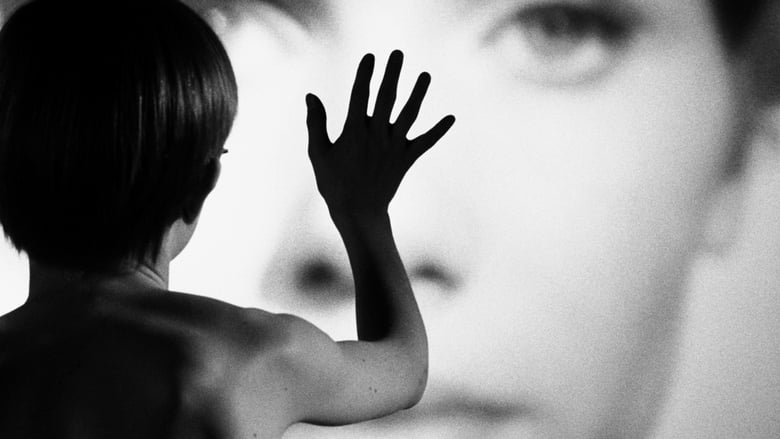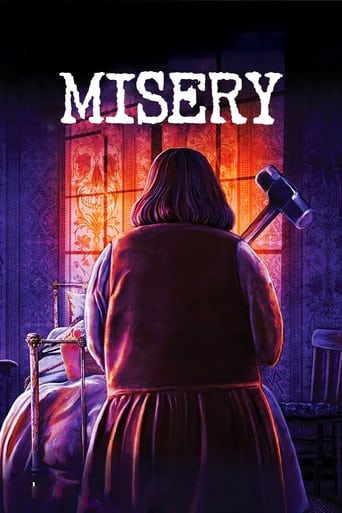

Persona (1966)
A young nurse, Alma, is put in charge of Elisabeth Vogler: an actress who is seemingly healthy in all respects, but will not talk. As they spend time together, Alma speaks to Elisabeth constantly, never receiving any answer. The time they spend together only strengthens the crushing realization that one does not exist.
Watch Trailer
Cast
Similar titles



Reviews
As Good As It Gets
To all those who have watched it: I hope you enjoyed it as much as I do.
The film never slows down or bores, plunging from one harrowing sequence to the next.
Through painfully honest and emotional moments, the movie becomes irresistibly relatable
For some reason Bergman is considered by many great directors & critics as one of the greatest directors of all time. After having seen The Seventh Seal (1957) and this one i can definitely declare that statement null and void.There's no doubt the black and white photography and the visual imagery are beautiful, and there is really nothing wrong with Bergman's skills with the camera itself, as he uses brilliant closeups and wideshots combined with great cinematography to create a visually impressive film. But these kind of factors need to be combined with the context of an actual story to truly make an impression on its audience, since simply showing pretty images all the time isn't what cinema is about. It's about a combination of technical expertise and relatable human emotion to create a great immersive experience, but this film only has one of these traits.I suppose this movie is generally well liked mostly by pseudo intellectuals who think themselves very smart for liking such an incomprehensible film. The first forty five minutes of the film are pretty linear and straight forward, and do not seem to be anything out of the ordinary. Now these first 45 minutes weren't very good either, but atleast it was coherent and it seemed to have an actual plot. It still never made any sense that the connection between the nurse and a mute actress became so strong so quickly and that she would tell her about something so sensitive that she never told anybody before, but atleast Bergman seems capable of telling a story for some part in a film. However, after the 45 minute mark is where it gets considerably worse and its final 30 minutes focus solely on muddled and repetitive dialogue, weird editing & just a complete mess of a conventional narrative structure to make sure you will have no idea what's going on. Totally seemingly irrelevant images of a spider, a nail being driven through a hand, a boy reading some book are seen throughout the film and all of them are designed so the film can appear to be intellectual, while in reality it isn't. It's easy to say that the film isn't meant to have a conventional narrative structure or an actual cohesive plot because of its ability for pseudo intellectuals to 'Open your mind', because that would make it a whole lot easier to create an actual good film since there is no need for a story, characters, character development or creating a coherent experience in films like this. These kind of experiences are never immersive, because we do not feel connected to the main characters in any way because their connection built in the first 45 minutes feels so wobbly and fake.So, in terms of visuals and camera work there really is nothing wrong with Bergman's way of directing, but it's the messy plot structure and the disconnected editing and sometimes addition of irrelevant images is what turns this film into a pretentious jumble.
Wow, this film really left me behind with ambivalent feelings. On the one hand, it offers excellent acting and truly beautiful black&white shootings of both landscape and human physiognomies, but on the other hand, there are so many obscure scenes in it that even studied psychologists have a hard time in explaining the meaning of it all. It surely was also in the Intention of director Bergman to leave space for interpretation but one should be careful not to overburden the spectator.I truly enjoyed the first two thirds of the movie, which are quite straightforward apart from the first five minutes of seemingly unconnected and quickly changing film sequences (one of them being a young boy longing for a big motherly face on a screen). A young nurse is assigned to a new patient, an actress, who seems to be healthy apart from the fact that a few months ago she fell into speechless silence. To support a better recovery they are both sent to a house on the beaches. The young nurse tries to fill in the gap of silence by telling stories of her own life. This is a bit like the situation on a psychiatrist's couch where the patient keeps on talking as an answer to the doctor's simple comments or even silence, only that the roles in this case are turned upside down, because the nurse takes over the role of the patient and the mute patient takes over the role of the psychiatrist. Her admiration for someone being an actor and appreciative smiles make the nurse become more and more trustful until she even makes confessions about sexual experiences and an abortion. She is wondering why sometimes she does not live up to her own standards. These monologues are in fact more entertaining than expected. They never really become too long and are supported by great acting.Then the nurse gets to read a letter written by her patient, in which the patient is passing on the nurse's private confessions and describes her as interesting to watch. From this moment on, the nurse feels betrayed in her affection to the patient and her behavior changes to hostile. I especially liked the scene where the nurse leaves a piece of broken glass on the floor hoping that her patient would step into it and when she does the actress for an instance is breaking her silence with an Ouch.Oddly enough, despite the tensions, the nurse, in the last third of the movie, starts more and more to project her own thoughts and fears (of being a bad mother unable to love her own child, maybe the boy from the beginning?) onto her never dissenting patient and seems to get one person with her. When the patient's husband is visiting, the nurse is even mistaken by the husband to be his own wife. In how far the nurse's projections meet with the patient's reality is hard to tell as the patient remains quite an unreadable book. Then in one scene, we see the nurse waking up, so probably all the oddities from the last third of the movie can be explained by being a dream reflecting the nurse's subconscious, which tells her to be lost in very much the same way as her patient.Is it about not being able to cope with the dishonesty and harshness of life that leads us into speechless isolation? Is it about all of us having more than one personality and normally showing only one of the many as a disguise? Is it even about behind this disguise being nothing? Or is it about not being able to help each other, since in the end, the patient still does not speak and both the nurse and the patient leave the house separately.Finally, I was sitting in front of the credits knowing to have seen something substantial but feeling a bit dizzy at the same time. Still, the positive impressions clearly predominate and therefore I give it 8 points out of 10.
The Criterion DVD is great! Not only is there the usual subtitles but there are also three soundtracks. A commentary in English, the original Swedish soundtrack , and a dubbed English soundtrack. This not only gave me an opportunity to effortlessly watch the movie (without having to read the subtitles at the same time), but it also gave me an opportunity to read English subtitles and hear the dubbed English and find out how different the one is from the other. Finally, I did watch it in Swedish with English subtitles as I usually do with foreign movies.Even though I have only recently become a Bergman fan, it is better late than never. This Bergman film was riveting for me from beginning to end. Though the story seems straight forward, I can interpret layer upon layer of possible meaning to the movie and would enjoy some conversation about it here.The basic story is that a stage actress (played by Liv Ullmann) who is suddenly struck dumb while performing Electra. After being sent to a mental hospital, her doctor decides that she is well enough to leave and sends the her and her nurse (played by Bibi Andersson) to a seaside home together. The two become not only patient and nurse, but also trusted friends. Since the patient never talks, the resulting pregnant silence allows (or compels) the nurse to talk more and more, opening up secrets about herself. At times, we feel that the roles of patient and nurse become reversed. At other times, we feel that the roles of the actress and HER audience (the nurse) become reversed. Then there is the positions of voyeur and performer. Which is which—and when?What about OUR roles as the audience? Don't WE feel that we, too, are looking into this relationship as voyeurs? But, whatever roles are being played here, the participants seem willing to play the role, until the nurse reads a letter from the actress to her psychiatrist in which she talks about what the nurse has relayed to her in confidence. When the nurse becomes upset, she confronts and reproaches her own patient to shift the "spotlight" back on the patient (the actress).About the time we realize how complex this movie might be, Bergman starts to blend and morph one person's face into the other's (sort of a half Ullmann and half Adnersson shot). NOW, I begin to wonder if we are seeing two sides (or multi-faceted sides) of the SAME person.0The film is resplendent with multi-faceted interpretations. Here's yet another: "A 'persona,' in the word's everyday usage, is a social role, or a character played by an actor. The word derives from the Latin for "mask" or "character", derived from the Etruscan word "phersu", with the same meaning." ---(From Wikipedia)
During the opening to this film, I had no idea what kind of movie I was watching. It shows film unrolling in a projector, gore, a strange silent film for a few seconds, and finally an old woman, cut in with pictures of a young boy, laying down in seemingly the same room. We see him wave his hand in front of what seems to be a large screen. We see our main characters appear. The credits start. I think this montage is to show us that we are watching a film, and the potential for what it can be at that moment is endless, considering its up to the creator to decide. This fits in with what we learn about Elisabet Vogler, an actress who suddenly, during an audition, got silent, and had a "sudden urge to laugh", and she has not said a word since. We learn she does have a husband and a life, and she even clearly cares for him, so this sudden change is perplexing to many. But it is this sudden change that shows that the individual is completely in control of their persona, and can change it at any minute. In fact, we all do it, as demonstrated by the nurse of Elisabet, Alma. Almost daily we change our outward personality depending on who we are with and when and where. The film suggests we are almost never exactly who we are on the inside. But the most thought provoking question the film presents is this: can we change who we are on the inside?The answer is yes throughout the film. Alma, at one point in the film, has a long monologue about a boy she slept with on a beach, how it was the best sex ever (yet she still feels guilty), how she got pregnant from the kid (but had sex with her husband the same night), and how her husband and her both got an abortion, but were happy they did. She mentions that she felt like a different person when it was happening. Throughout the film it seems that the two characters are merging into one, and my theory is that they are both the same person. When Alma is delivering the mail for Elisabet, she realizes her mail isn't sealed, and checks it. It involves Almas personal story, and it says that Elisabet is studying Alma. Alma feels offended and wants to get her to finally stop and talk. There is a long scene involving Elisabet walking around and finally stepping on a shard of glass Alma accidentally shattered, this seems to be Alma attempting to get Elisabet to talk, or react in any way, but all she hears is "ow!". Suddenly, Elisabet's husband finds her and Alma, but Alma is talking to him. At first she says, "I am not your wife". But he goes on about how "you love somebody, or say you do... it gives you security, a chance to endure, doesn't it?" which calls back to Alma earlier in the film when she reads her letter to Elisabet that was from Mr. Vogler, and both times he mentions that they both treat each other as "anxious children", and what matters is their intentions. This also calls back to when Alma reads "all our faith and doubt is evidence of our loneliness". Elisabet stands in the room as they have sex, but I believe she is only metaphorically there, in that she is a part of Alma and vice versa. The next scene involves Alma talking to Elisabet about her being told she cannot be a mother, then feeling that she needs to prove to herself and others that she can be a good mother then becoming terrified when she gets pregnant then wanting an abortion but having it fail multiple times then hating the child, but the child loved her unconditionally so it was hard. Then, this same scene plays again, only this time we are watching Alma and not Elisabet. This is another nod to the director being able to control the film entirely, but also, at the end of this one, Elisabets face is superimposed over half of Almas. So, if Alma and Elisabet were the same person, why would they have two different stories of getting pregnant and having a successful abortion and one failed abortion? I believe the failed abortion is true, but Elisabet is Almas suppressed true inner feeling of being an "actor" in everyday life. She sometimes plays different roles, during the pregnancy, the role of the happy expectant mother. Of course these almost never align with her inner self, as stated before. But ultimately it shows that we all have multiple "people" to us, even on the inside. And sometimes we can even convince ourselves that we are a different type of person for our own sake. I think Elisabet does this when she invents Alma, who had a successful abortion. Of course we never go as far as literally convincing ourselves that something different happened to us in the past, but it's a metaphor for how we choose different personalities even internally. Life may seep back through and prevent us from doing so, but we go back to hide ourselves from the horrors of the world.This is a very complex movie, especially for taking up only a short 85 minutes of my day, but I can promise it will inhabit your mind for much longer than that. It cuts from past to present at random, blurs the lines between reality and fantasy, and sometimes deviates completely from the main story to show us that we're watching a film with strange montages. It's about life, the human race, our psychology, film itself, and sometimes nothing at all. It's the most perplexing film I've seen since "Last Year At Marienbad" and thats intentionally perplexing. I mean all of this in the best way. It is one of a kind.









